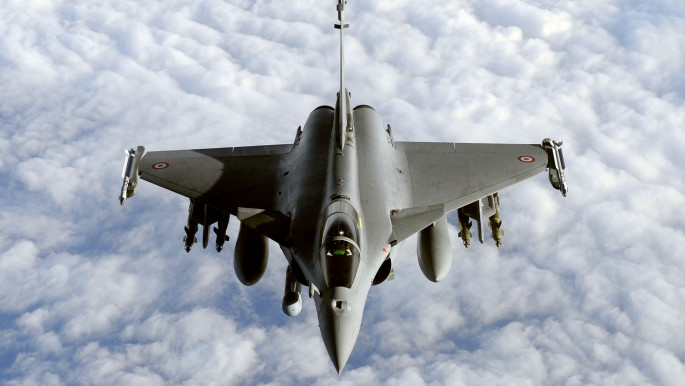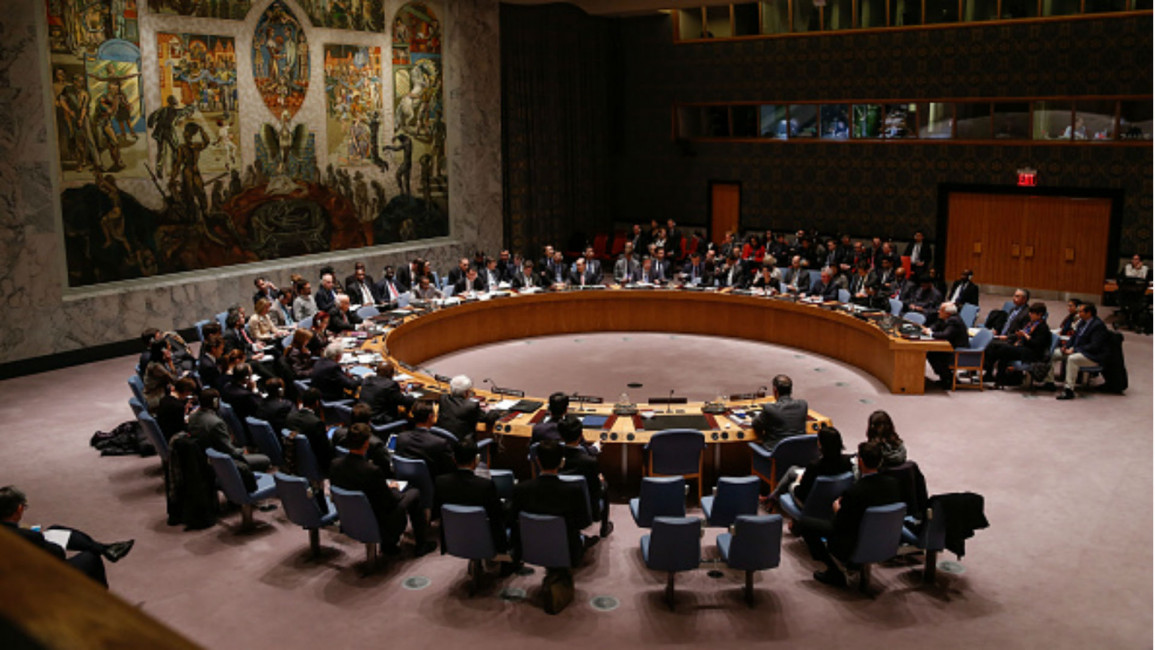
UN Security Council: Brokers of peace, merchants of war
The permanent members of the UN Security Council - the very states charged with maintaining world peace - are among the largest arms traders on the planet, supporting conflict wherever they sell their instruments of death.
These five countries, as well as Germany, are the architects of the recent deal to curtail Iran's nuclear ambitions, but are also the prime movers in an arms trade worth more than $1.7 trillion a year.
International standards
In 2012, Amnesty International published a detailed report detailing the measures states should take to thoroughly assess the risk that a transfer of conventional arms would result in the serious violation of international human rights law.
This included whether the recipient state had signed international treaties, whether the recipient state had legal and administrative apparatus in place, whether accountable government infrastructure exists, and the degree of cooperation with UN mechanisms engineered to monitor the situation in the country.
Several months later these recommendations were adopted by the Arms Trade Treaty, which sought to regulate the international trade in conventional weapons for the purpose of regional peace, the reduction of human suffering and the promotion of cooperation and transparency.
| [French-made] jets will undoubtedly be deployed on the Sinai front, and possibly further afield in Libya |
All EU members of the Council - and the United States - signed and ratified the document. Russia and China both abstained.
Despite international institutions' insistence that monitoring the supply of conventional weapons helps to avoid them ending up in the hands of well-known human rights abusers, the Council continues to channel weapons to states locked in wars which are violating key principles of international human rights.
Fanning the flames
In Egypt, Sisi's rule is paramount, two years after the Rabaa massacre in which hundreds of pro-Morsi supporters were gunned down in the streets. Threats of further oppression hang over those wishing to commemorate the event.
Sisi has forced numerous civil society and human rights organisations underground and his campaign against Islamist millitants in the Sinai has wrought misery to the peninsula's residents.
The social effects of this campaign haven't worried the French, however.
Paris concluded a $5.6bn sale of Rafale jets to Egypt last month.
These jets will undoubtedly be deployed on the Sinai front, and possibly further afield in Libya - in cooperation with the UAE - where previous bombing runs have done much to contribute to the unfolding civil war.
And in Iran, with the promise of the end of sanctions, French companies have reportedly set their eyes on reviving Tehran's flagging air force.
Old friends and new
The nuclear deal between Iran and world powers - a push to bring stability to the region - has had many an unpleasant side effect.
Just days after it was announced, the US State Department approved a $5.4bn sale of 600 PAC3 missiles to Saudi Arabia, and $500m of ammunition for small arms - much of which will undoubtedly be used in Yemen and Syria by Saudi proxies who have committed egregious human rights violations; Riyadh abstained from the Arms Trade Treaty.
Israel is rumoured to be close to an "unprecedented" arms deal with the US, with President Barack Obama anxious to ameliorate the recent souring of relations following the agreement to temper Iran's nuclear ambitions.
 |
|
| More French-made Rafale jets will soon be flying Egyptian air force missions [AFP] |
Israel's actions in the Gaza strip last year, meanwhile, have been in gross violation of fundamental standards of the law of armed conflict.
East vs West
Russia and China have for years sold to nations considered by their Western rivals as "pariah" states, including Syria and Iran.
Russia has sold Tehran a sophisticated surface-toair missile system to protect its nuclear reactors. China, which has recently usurped Germany as the world's third largest arms dealer, is also thought to have provided Iran with weapons through secret deals.
The regime of Bashar al-Assad has been supported by conventional weapons from Russia and Iran - the now infamous barrel bomb attacks on Aleppo and Homs have largely been carried out by Mil-Mi 24 attack helicopters - an infamous Russian-made aircraft.
Iran's neighbour, Iraq, was armed with billions of dollars of US equipment after Obama withdrew US forces - a huge amount of which is now in the hands of the Islamic State group after it swept through northern Iraq.
Baghdad's response is to ask for more, and the arms have been duly delivered - 296 aircraft supplied in 2014, up from 168 in 2013.
IS continues to murder with stolen weapons, while the Iraqi militias, the Hashd al-Shaabi, have been key in the fight against IS, but are thought to have committed egregious human rights abuses in the process.
There has been little US congressional oversight on the link between these sales and the actions of these militias, and there is a real risk that the US is indirectly replicating the sectarian situation which engulfed much of the country during the surge in 2007.
Gulf heavyweights
Saudi Arabia, UAE and Oman are respectively the second, eighth, and 10th largest importers of weapons in the world. Saudi Arabia has notably been putting its war machine to use in Yemen. Saudi airstrikes have killed hundreds, if not thousands, of Yemeni civilians, and contributed significantly to the unfolding humanitarian crisis.
Many of these airstrikes have come via the Typhoon jets supplied through the al-Yamamah arms deal between the UK and Saudi Arabia, in which 72 multirole Typhoon fighters were supplied in 2006, as part of a notoriously controversial supply agreement first carved out by the Thatcher administration.
UK arms deals to Saudi Arabia in 2013 alone accounted for sales of an estimated $2.5 billion. The UAE sees Islamic extremism as an existential threat and has taken measures to adopt a militarised nationalism policy. The Emirati army's budget doubled between 2009 and 2014 - it spent $5bn at a recent arms expo.
| Read more: Corruption remains a cornerstone of UK-Saudi relations, writes Richard Brooks |
This will cause salivation in Washington, which has recently sold Predator drones to Abu Dhabi, making it the first non-Nato member to acquire such hardware. Turkey, Nato's easternmost member, is the third-largest arms importer in the world - and is currently engaged in airstrikes against foes both old and new.
| Turkey is unlikely to lose its standing as a prolific consumer of conventional weapons |
The disintegration of the peace process with the PKK, and the entrance into the coalition against IS means that Turkey is unlikely to lose its standing as a prolific consumer of conventional weapons.
The various, interlinked theatres of war in the Middle East are fed arms by permanent members of the UN Security Council, yet these states are meant to be transparent and impartial brokers in any eventual peace process.
With Libya, Syria and Yemen coming apart at the seams, it is the world's arms dealers, and the politicians with links to them, that will benefit. What the Middle East needs more than ever is a comprehensive ratification of the Arms Trade Treaty by all members of the Security Council - and a genuine concerted effort to stem the flow of weapons to the region.
The economies and societies of the MENA region are in tatters after years of war and providing assistance to those worst affected.
It is within both the social and economic interests of the Security Council to bring an end to these conflicts as swiftly as possible - and a deeper scrutiny of arms sales to those involved would be a start.
Nick Rodrigo is a freelance researcher working for the Afro-Middle East Centre based in Johannesburg. He holds an MA in the Theory and Practice of Human Rights from the University of Essex, and has previously worked with Iranian and Palestinian human rights organisations.
Opinions expressed in this article remain those of the author and do not necessarily represent those of al-Araby al-Jadeed, its editorial board or staff.




